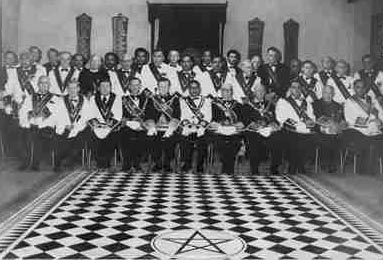 Freemasonry's "Mosaic" Pavement:
"In Masonic tradition Ceasar Augustus is named as the
partron of the masons in ancient Rome and is said to have
been Grand Master of the Roman College of Architects. This
society was organized into guilds with symbols based on the
tools of their trade such as the plumb line, the square,
compasses, and the level. The College had initiation rituals
involving the pagan myth of death and rebirth which are
familiar from the Egyptian Mysteries. A temple built and
used by the College was unearthed at Pompeii which had been
destroyed by the volcanic eruption of Mount Vesuvius in 71
CE. Among the symbols discovered in the temple were the
double triangle of Soloman, the black and white tracing
board (first used by Dionysian Artificers), the skull, the
plumbe line, the pilgrime's staff and the ragged robe. These
symbols later emerged in medieval and speculative
Freemasonry." -- Howard, Michael, "The Occult Conspiracy",
page 18 Freemasonry's "Mosaic" Pavement:
"In Masonic tradition Ceasar Augustus is named as the
partron of the masons in ancient Rome and is said to have
been Grand Master of the Roman College of Architects. This
society was organized into guilds with symbols based on the
tools of their trade such as the plumb line, the square,
compasses, and the level. The College had initiation rituals
involving the pagan myth of death and rebirth which are
familiar from the Egyptian Mysteries. A temple built and
used by the College was unearthed at Pompeii which had been
destroyed by the volcanic eruption of Mount Vesuvius in 71
CE. Among the symbols discovered in the temple were the
double triangle of Soloman, the black and white tracing
board (first used by Dionysian Artificers), the skull, the
plumbe line, the pilgrime's staff and the ragged robe. These
symbols later emerged in medieval and speculative
Freemasonry." -- Howard, Michael, "The Occult Conspiracy",
page 18 
" The floor of the tabernacle and the pavement of Soloman's
temple were thus ornamented. Mosaic or tesselated pavements
were common among the ancients; the Egyptians, the Greeks
and especially the Romans most ingeniously decorated the
floors and walls of their temples in this manner."
-- Freemason MaCoy, "A Dictionary of Freemasonry", page 252
|
|